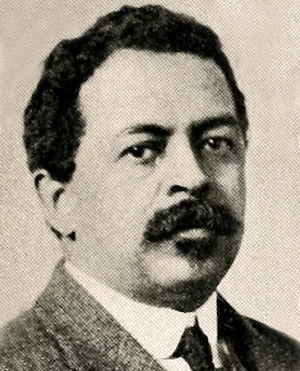By Ryan Kambich
A political radical and ardent advocate for civil rights, William Monroe Trotter pursued a vocation of activism that brought him into conflict with everyone from President Woodrow Wilson to W.E.B. DuBois, revealing a life spent in uncompromising pursuit of a just society.
Born in 1872 to a family deeply marked by the institution of slavery, Trotter grew up in Boston, immersed in the city’s political activism that had nurtured generations of abolitionist thought. His father, James Monroe Trotter, had been born into slavery in Mississippi before fighting for the Union during the Civil War and eventually becoming the first man of color employed by the United States Postal Service. His mother, Virginia Isaacs, was the three-times great granddaughter of Elizabeth Hemings, sister to Sally Hemings – the enslaved woman with whom Thomas Jefferson fathered multiple children.
Trotter excelled in school, and after high school he enrolled in Harvard University. An active campus leader and recipient of multiple merit scholarships, Trotter became the first man of color to be inducted by Harvard’s Phi Beta Kappa chapter when he graduated magna cum laude in 1895. The following year, he earned his master’s degree from Harvard.
Despite his exemplary academic record, Trotter struggled to find work in Boston’s deeply segregated labor market. For the first few years following his graduate study, Trotter mostly worked in low-paying clerk positions at white real estate firms. After years of saving, he briefly broke away to start his own mortgage company, helping to finance black home ownership in Boston. The work, while financially rewarding, failed to excite Trotter’s passion for political activism – an appetite he inherited from his father who had been a leader in the Democratic Party throughout New England.
In 1901, after years of watching as the last embers of Reconstruction were stamped out by the rise of white terrorism in the south and vicious segregation expanding throughout the north, Trotter started his own newspaper, the Boston Guardian. In an era of muckraking journalism, which gave little thought to pretensions of journalistic objectivity, Trotter’s Guardian joined a long legacy of black-owned newspapers intent on advocating for a more just society. Along with his co-founder George W. Forbes – one of Boston’s first black librarians – Trotter operated the Guardian out of the same building where William Lloyd Garrison had published The Liberator. The paper functioned as a publishing outlet for Trotter’s thinking on civil rights and anti-segregation activism while simultaneously serving as an important institution in Boston’s black community – recording the hardships of life both in the Jim Crow south and segregated north, investigating and publicizing unreported acts of racial violence, and hosting advertisements for local black-owned businesses.
But Trotter’s political activism grew far beyond his work as a publisher. Trotter was one of many more radical civil rights activists who criticized the then-dominant model of incremental racial reform politics popularized by Booker T. Washington. This political approach sought an end to black activism for political equality and desegregation in a compromise for access to education and vocational training. Alongside others, namely his former Harvard classmate W.E.B. DuBois, Trotter pursued a politics trained on legal equality and the enforcement of constitutional rights. Towards this end, he organized civil rights groups in Boston and planned protests in support of anti-lynching legislation – modeling tactics that the later Civil Rights Movement would adopt in part. Trotter co-founded the Niagara Movement in 1905, a significant source of civil rights organizing and activism throughout the north, from which Washington was explicitly excluded.
Trotter believed in direct political action, oftentimes to the discomfort of those who drew his scorn. In 1903, Washington travelled to Boston to speak to the National Negro Business League. Still perturbed by Washington’s ideology and place as a leading civil rights figure, Trotter and several associates arrived and heckled Washington so mercilessly that they were arrested for disturbing the peace in what the press dubbed the “Boston Riot.” Later, Trotter drew the ire of then-President Woodrow Wilson at a 1914 meeting at the White House on behalf of the National Independent Political League. Trotter relentlessly confronted the president on his decision to re-segregate the federal civil service, prompting Wilson to have Trotter removed from the White House.
He did not limit his uncompromising style to just those whom he saw as enemies of civil rights progress. Trotter and DuBois’ Niagara Movement eventually formed part of the foundation of the nascent NAACP. While Trotter initially participated in the organization’s founding, he came to resent the presence of white activists in the early movement and the addition of members he saw as too moderate. Trotter eventually drifted from the group and from his old fried DuBois, considering the organization too compromised by an emerging gradualist approach to civil rights.
After leaving the movement, Trotter continued to publish the Guardian and agitate for civil rights. In 1915, his paper briefly helped to raise a controversy surrounding D. W. Griffith’s KKK-apologist film The Birth of a Nation – which Wilson had screened at the White House. In later years, however, financial struggles at the Guardian left Trotter largely impoverished and lacking much of the financial support his activism had relied on in his earlier years. On his 62nd birthday in 1934, deeply in debt and emotionally exhausted, Trotter fell to his death from his roof in either an unfortunate accident or tragic suicide. Today, the William Monroe Trotter Institute at the University of Massachusetts Boston helps to carry on his legacy through its support for the study of black history and black culture. Similarly, the Trotter Multicultural Center at the University of Michigan seeks to foster intercultural engagement and provide a supportive home to those committed to social justice and diversity.
Ryan Kambich earned his bachelor’s degree in philosophy, politics and the public at Xavier University, where he became a member of Phi Beta Kappa in 2019. Xavier University is home to the Pi of Ohio chapter of Phi Beta Kappa.




